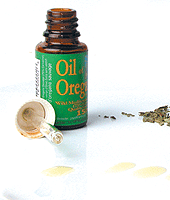Advertisement
Oregano Oil
The essential oil of oregano is widely appreciated for its many health benefits. A powerful antioxidant, antibacterial, antiviral and antiseptic, it can be used to treat a variety of ailments including food poisoning, giardia, flu, toothache, insect bites, athlete’s foot, and candida. Will the Real Oregano Please Stand Up? There are several types of oregano. … Continued
 The essential oil of oregano is widely appreciated for its many health benefits. A powerful antioxidant, antibacterial, antiviral and antiseptic, it can be used to treat a variety of ailments including food poisoning, giardia, flu, toothache, insect bites, athlete’s foot, and candida.
The essential oil of oregano is widely appreciated for its many health benefits. A powerful antioxidant, antibacterial, antiviral and antiseptic, it can be used to treat a variety of ailments including food poisoning, giardia, flu, toothache, insect bites, athlete’s foot, and candida.
Will the Real Oregano Please Stand Up?
There are several types of oregano. The culinary spice that claims to be oregano and gives your pizza its Italian flavour, is sometimes common marjoram and quite different from the oregano used for health benefits. The major difference between these look-alike herbs is the type and quantities of phenols (compounds with antiseptic properties) they produce. With just a touch, leaves of oregano plants release their aromatic phenols to dissuade insects, animals, and microbes from eating their flowers and seeds.
True oregano (Origanum vulgare ssp. hirtum) is coveted for its medicinal value because the naturally occurring carvacrol (liquid phenol) content is higher than 55 percent of its essential oil. In 1996, the Journal of Agricultural and Food Chemistry published a study undertaken by the Aristotle University in Greece whereby they analyzed oregano oil products and found some to be marjoram or thyme oil mislabelled as oregano oil.
Medicine Plant
In 2000, British researchers reported in the Journal of Applied Microbiology that oregano has one of the widest spectrums of antimicrobial activity known in plants, with a capacity to destroy a variety of bacteria, viruses and fungi. Oregano oil demonstrated antibacterial properties against 25 different types of bacteria, reinforcing its status as a potent natural antibiotic.
In 1995, the Journal of Applied Nutrition reported that oregano oil, and naturally occurring carvacrol in particular, inhibits growth of candida far more effectively than a commonly employed antifungal agent.
A research study published in Phytotherapy Research in 2000 found that after oregano oil was orally administered to 14 people suffering from intestinal parasites Blastocystis hominis, Entamoeba hartmanni and Endolimax nana, the parasites completely disappeared after six weeks.
Georgetown University tested many essential oils in vitro and determined that oregano was effective against systemic Candida, staph infection, bacillus anthraxis (anthrax), and E. coli. In recent viral tests, Microbiotest Laboratories demonstrated that oregano reduced cold and flu viruses significantly.
How to Use Oregano
Topical oregano oil may be applied as needed to the skin, but remember to keep it away from your eyes and other sensitive areas.
An adult dose taken orally is 50 milligrams of oregano oil delivering 37 to 43 mg carvacrol per day for up to 21 days. After a two-week break, you can resume this cleansing, supplemental dose for another 21 days and so on.
Intensive doses of oregano (50 mg to 100 mg two to three times per day delivering from 74 to 255 mg carvacrol per day for up to 14 days) should only be taken under the direction of a health professional. If a product recommends more than these dosages, chances are it is not pure oregano oil from true oregano.
Cautions
Oregano oil is not recommended for long-term use, for children under 12, or to be taken during pregnancy or lactation.
In 1991, the International Journal of Food Microbiology reported that oregano inhibited growth of Lactobacillus cultures. Indeed, as with any supplement used to reduce microbes, after using oregano oil you should take a good probiotic – micro-organisms that your body needs for health – to help restore your friendly flora.
Use wisely and use sparingly, and oil of oregano will weave its powers far and wide.




